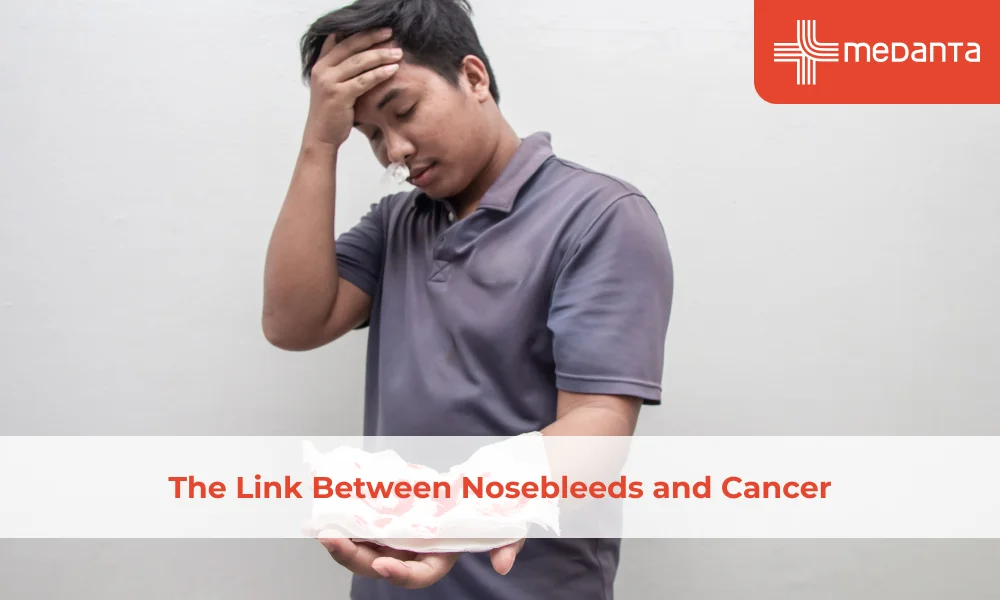The Link Between Nosebleeds and Cancer

TABLE OF CONTENTS
Nosebleeds, also known as epistaxis, are a common phenomenon, especially among children and adults over 50 with certain medical conditions. These are generally classified as minor, anterior injuries caused by the common cold, or unsuspecting, self-inflicted activities.
How Do Nosebleeds Occur?
The lining around the septum, that is, the wall dividing our nostrils holds a large number of tiny blood vessels that are extremely vulnerable to damage as they are so close to the skin surface.
Activities such as nose-picking, a hit to the nose during play, rubbing the nose too hard, or when a foreign object, such as the small part of a toy, is inserted in the nasal cavity in children can lead to nosebleeds.
Similarly, older people have other underlying health conditions such as high blood pressure, an old or recent facial injury, or nasal cancer. Although comparatively rare, this type of nosebleed can be classified as a posterior nosebleed as they start behind in the deeper area of the nose, and may require immediate medical help.
Other causes for spontaneous nosebleeds include:
Allergy medication, or other prescribed drugs that tend to dry out the nose or thins the blood
Dry, heated conditions or low indoor humidity leading to dry mucous membranes
A rare disorder called ‘hereditary haemorrhagic telangiectasia’, or HHT
Frequent use of nasal sprays
Recurring nosebleeds can be a symptom of more serious conditions such as leukemia, nasal and sinus cancer, lymphoma, nasal polyps or tumors, hemophilia immune thrombocytopenia (ITP), and others.
Why Cancer Can Give You Nosebleeds
A reduced platelet count is one of the major factors that can cause nosebleeds. Certain treatments for cancer, such as chemotherapy in the case of breast cancer, targeted therapies like Avastin (bevacizumab), pain killers such as aspirin, ibuprofen, etc, are known to lower your blood platelet count, leading to a risk of hemophilia, or blood loss due to non-coagulation of blood.
This increases the probability of severe nosebleeds among cancer patients who could rupture the nasal lining by blowing the nose too hard, sneezing, or accidentally bumping it.

How To Manage a Nosebleed
While nosebleeds cannot be prevented, they can be managed effectively.
If you are someone who experiences frequent nosebleeds or has a loved one who does, here is what you need to know:
The nose can bleed from one or both nostrils, lasting up to 10 minutes or more. This can occur even if you are asleep. A bleeding nose can be managed if you:
Sit upright rather than remain in a lying or sleeping position. This prevents the blood from running down the back of your throat, choking you or making you vomit.
Do not tilt your head behind. Instead, lean your head forward and breathe through your mouth. This will also help the blood drain out through the nose.
Pinch the soft, fleshy tip of the nose for 10 to 15 minutes to reduce the blood flow.
If available, an ice pack can help. This can be placed on the bridge of the nose.
How To Prevent a Frequent Nosebleed
If you or someone you know is experiencing frequent nosebleeds, these tips may help reduce their severity or number:
Check the humidity factor in your home or surrounding. Humidity levels over 60% are known to cause the growth of bacteria, mould, fungus, and mildew. This could be the leading cause of dry throats, congestion and frequent colds in your home. A cool-mist humidifier can relieve dry congesting environments by using ultrasonic vibrations and fans to release cool mist or water moisture into the air.
Consult with your doctor and check for any underlying allergies you may have or nasal infections.
Consider the use of saline nasal sprays or a ‘neti pot’ to treat frequent or blocked sinuses.
Children tend to stick small things or fingers into their nose, sometimes causing nosebleeds. Ensure your child’s fingernails are clipped short so he or she may not rupture the lining around the nostrils, especially if just recovering from cold-and-flu symptoms.
When Is a Nosebleed an Emergency?
Regardless of whether it is your child, yourself, or an adult suffering from a nosebleed, you need to seek immediate medical help if:
You can taste blood. This could mean the source of the bleed is located in the posterior or back of the nose which contains major blood vessels. In this case, the nosebleed cannot be helped by pinching the tip of the nose.
The nose hasn’t stopped bleeding for 20 minutes or over
If the bleeding is profuse and you feel weak or dizzy due to significant loss of blood
If the nosebleed was caused by physical trauma, that is, a blow or injury to the head or face, and you have trouble breathing
If you suffer from high blood pressure or hypertension, or hemophilia
Nosebleeds can come on without any other warning symptoms, which is why they can be a nuisance to deal with. However, although most of them are potentially harmless, it is important to consult with your doctor about the basic do’s and don’ts when you have a nosebleed, and also to rule out any major or underlying health complications.






